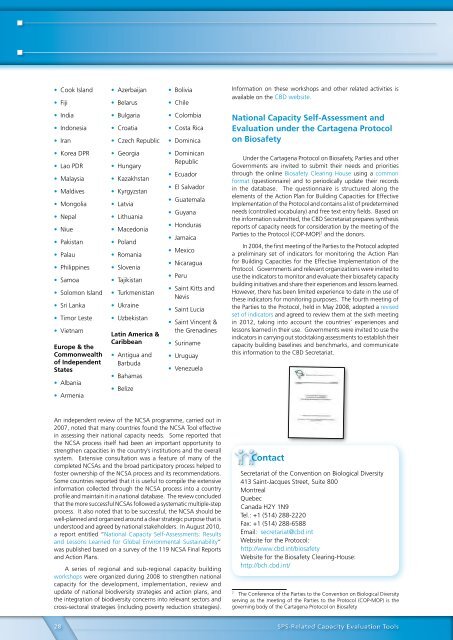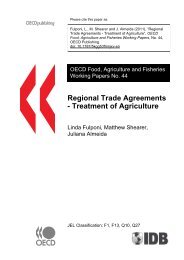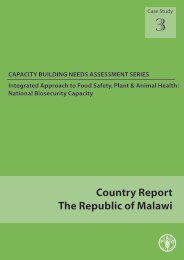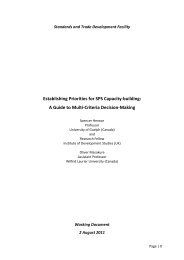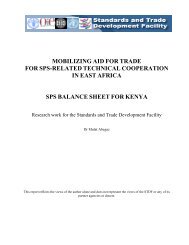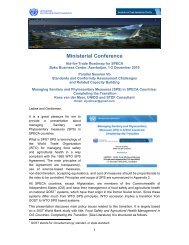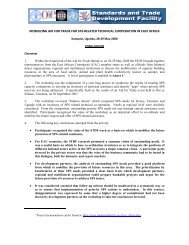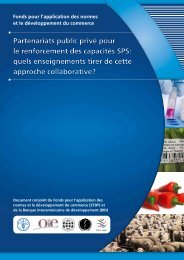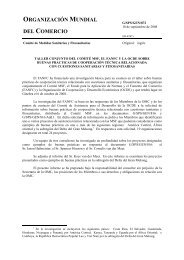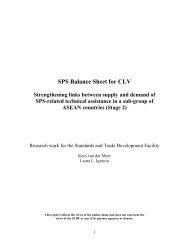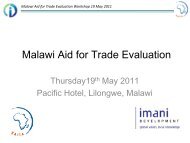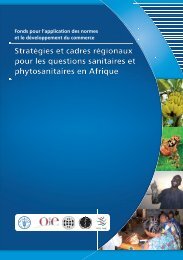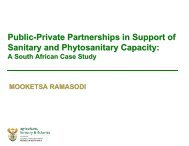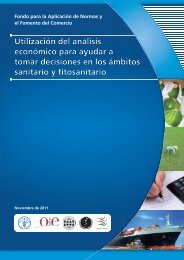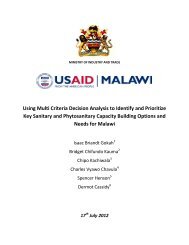SPS-Related Capacity Evaluation Tools - Standards and Trade ...
SPS-Related Capacity Evaluation Tools - Standards and Trade ...
SPS-Related Capacity Evaluation Tools - Standards and Trade ...
You also want an ePaper? Increase the reach of your titles
YUMPU automatically turns print PDFs into web optimized ePapers that Google loves.
• Cook Isl<strong>and</strong><br />
• Fiji<br />
• India<br />
• Indonesia<br />
• Iran<br />
• Korea DPR<br />
• Lao PDR<br />
• Malaysia<br />
• Maldives<br />
• Mongolia<br />
• Nepal<br />
• Niue<br />
• Pakistan<br />
• Palau<br />
• Philippines<br />
• Samoa<br />
• Solomon Isl<strong>and</strong><br />
• Sri Lanka<br />
• Timor Leste<br />
• Vietnam<br />
Europe & the<br />
Commonwealth<br />
of Independent<br />
States<br />
• Albania<br />
• Armenia<br />
• Azerbaijan<br />
• Belarus<br />
• Bulgaria<br />
• Croatia<br />
• Czech Republic<br />
• Georgia<br />
• Hungary<br />
• Kazakhstan<br />
• Kyrgyzstan<br />
• Latvia<br />
• Lithuania<br />
• Macedonia<br />
• Pol<strong>and</strong><br />
• Romania<br />
• Slovenia<br />
• Tajikistan<br />
• Turkmenistan<br />
• Ukraine<br />
• Uzbekistan<br />
Latin America &<br />
Caribbean<br />
• Antigua <strong>and</strong><br />
Barbuda<br />
• Bahamas<br />
• Belize<br />
• Bolivia<br />
• Chile<br />
• Colombia<br />
• Costa Rica<br />
• Dominica<br />
• Dominican<br />
Republic<br />
• Ecuador<br />
• El Salvador<br />
• Guatemala<br />
• Guyana<br />
• Honduras<br />
• Jamaica<br />
• Mexico<br />
• Nicaragua<br />
• Peru<br />
• Saint Kitts <strong>and</strong><br />
Nevis<br />
• Saint Lucia<br />
• Saint Vincent &<br />
the Grenadines<br />
• Suriname<br />
• Uruguay<br />
• Venezuela<br />
An independent review of the NCSA programme, carried out in<br />
2007, noted that many countries found the NCSA Tool effective<br />
in assessing their national capacity needs. Some reported that<br />
the NCSA process itself had been an important opportunity to<br />
strengthen capacities in the country’s institutions <strong>and</strong> the overall<br />
system. Extensive consultation was a feature of many of the<br />
completed NCSAs <strong>and</strong> the broad participatory process helped to<br />
foster ownership of the NCSA process <strong>and</strong> its recommendations.<br />
Some countries reported that it is useful to compile the extensive<br />
information collected through the NCSA process into a country<br />
profile <strong>and</strong> maintain it in a national database. The review concluded<br />
that the more successful NCSAs followed a systematic multiple-step<br />
process. It also noted that to be successful, the NCSA should be<br />
well-planned <strong>and</strong> organized around a clear strategic purpose that is<br />
understood <strong>and</strong> agreed by national stakeholders. In August 2010,<br />
a report entitled “National <strong>Capacity</strong> Self-Assessments: Results<br />
<strong>and</strong> Lessons Learned for Global Environmental Sustainability”<br />
was published based on a survey of the 119 NCSA Final Reports<br />
<strong>and</strong> Action Plans.<br />
A series of regional <strong>and</strong> sub-regional capacity building<br />
workshops were organized during 2008 to strengthen national<br />
capacity for the development, implementation, review <strong>and</strong><br />
update of national biodiversity strategies <strong>and</strong> action plans, <strong>and</strong><br />
the integration of biodiversity concerns into relevant sectors <strong>and</strong><br />
cross-sectoral strategies (including poverty reduction strategies).<br />
Information on these workshops <strong>and</strong> other related activities is<br />
available on the CBD website.<br />
National <strong>Capacity</strong> Self-Assessment <strong>and</strong><br />
<strong>Evaluation</strong> under the Cartagena Protocol<br />
on Biosafety<br />
Under the Cartagena Protocol on Biosafety, Parties <strong>and</strong> other<br />
Governments are invited to submit their needs <strong>and</strong> priorities<br />
through the online Biosafety Clearing House using a common<br />
format (questionnaire) <strong>and</strong> to periodically update their records<br />
in the database. The questionnaire is structured along the<br />
elements of the Action Plan for Building Capacities for Effective<br />
Implementation of the Protocol <strong>and</strong> contains a list of predetermined<br />
needs (controlled vocabulary) <strong>and</strong> free text entry fields. Based on<br />
the information submitted, the CBD Secretariat prepares synthesis<br />
reports of capacity needs for consideration by the meeting of the<br />
Parties to the Protocol (COP-MOP) 7 <strong>and</strong> the donors.<br />
In 2004, the first meeting of the Parties to the Protocol adopted<br />
a preliminary set of indicators for monitoring the Action Plan<br />
for Building Capacities for the Effective Implementation of the<br />
Protocol. Governments <strong>and</strong> relevant organizations were invited to<br />
use the indicators to monitor <strong>and</strong> evaluate their biosafety capacity<br />
building initiatives <strong>and</strong> share their experiences <strong>and</strong> lessons learned.<br />
However, there has been limited experience to date in the use of<br />
these indicators for monitoring purposes. The fourth meeting of<br />
the Parties to the Protocol, held in May 2008, adopted a revised<br />
set of indicators <strong>and</strong> agreed to review them at the sixth meeting<br />
in 2012, taking into account the countries’ experiences <strong>and</strong><br />
lessons learned in their use. Governments were invited to use the<br />
indicators in carrying out stocktaking assessments to establish their<br />
capacity building baselines <strong>and</strong> benchmarks, <strong>and</strong> communicate<br />
this information to the CBD Secretariat.<br />
Contact<br />
Secretariat of the Convention on Biological Diversity<br />
413 Saint-Jacques Street, Suite 800<br />
Montreal<br />
Quebec<br />
Canada H2Y 1N9<br />
Tel.: +1 (514) 288-2220<br />
Fax: +1 (514) 288-6588<br />
Email: secretariat@cbd.int<br />
Website for the Protocol:<br />
http://www.cbd.int/biosafety<br />
Website for the Biosafety Clearing-House:<br />
http://bch.cbd.int/<br />
7 The Conference of the Parties to the Convention on Biological Diversity<br />
serving as the meeting of the Parties to the Protocol (COP-MOP) is the<br />
governing body of the Cartagena Protocol on Biosafety<br />
28 <strong>SPS</strong>-<strong>Related</strong> <strong>Capacity</strong> <strong>Evaluation</strong> <strong>Tools</strong>


